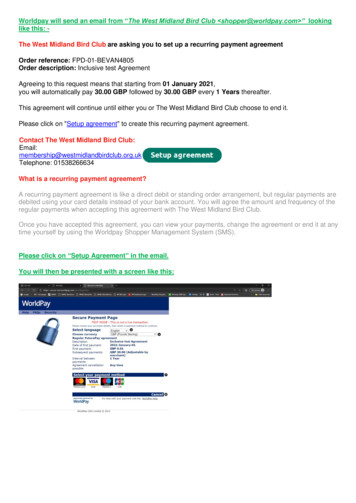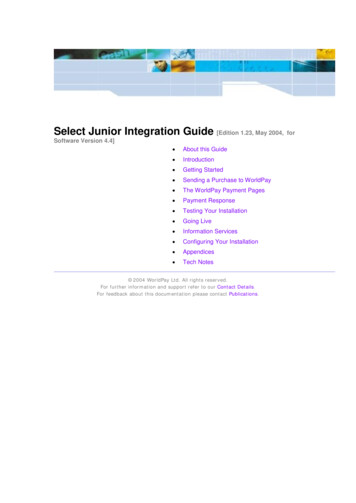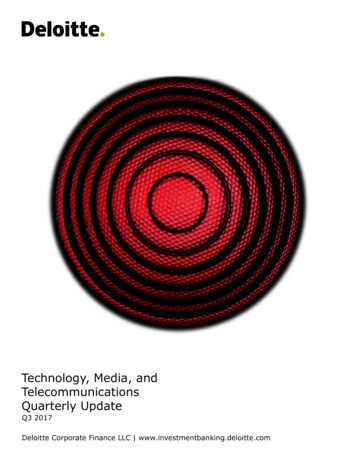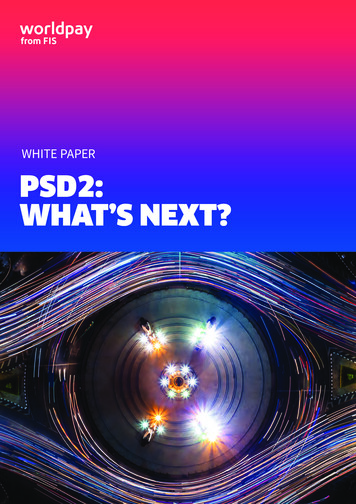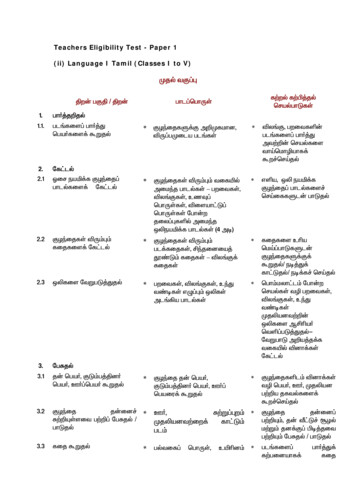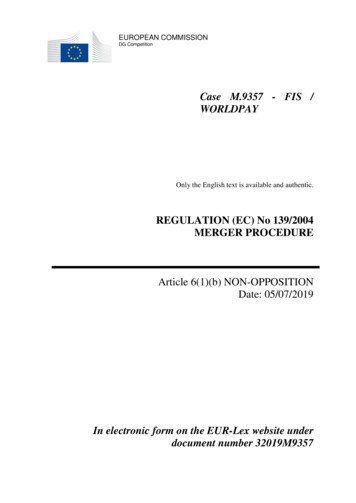
Transcription
EUROPEAN COMMISSIONDG CompetitionCase M.9357 - FIS /WORLDPAYOnly the English text is available and authentic.REGULATION (EC) No 139/2004MERGER PROCEDUREArticle 6(1)(b) NON-OPPOSITIONDate: 05/07/2019In electronic form on the EUR-Lex website underdocument number 32019M9357
EUROPEAN COMMISSIONBrussels, 5.7.2019C(2019) 5220 finalPUBLIC VERSIONIn the published version of this decision,some information has been omittedpursuant to Article 17(2) of CouncilRegulation (EC) No 139/2004 concerningnon-disclosure of business secrets and otherconfidential information. The omissions areshown thus [ ]. Where possible theinformation omitted has been replaced byranges of figures or a general description.To the notifying partySubject:Case M.9357 – FIS/WorldpayCommission decision pursuant to Article 6(1)(b) of Council Regulation1No 139/2004 and Article 57 of the Agreement on the European Economic2AreaDear Sir or Madam,(1)On 28 May 2019, the European Commission received a notification of a proposedconcentration pursuant to Article 4 of Council Regulation (EC) No 139/2004 bywhich Fidelity National Information Services, Inc. (“FIS”, US or the “NotifyingParty”) will acquire sole control over Worldpay Inc. (“Worldpay”, US or “WP” orthe “Target”). FIS and Worldpay are collectively referred to below as the “Parties”.1.THE PARTIES(2)FIS is a global provider of financial services technology, offering retail andinstitutional banking, payments, asset and wealth management, risk and complianceand outsourcing solutions.12OJ L 24, 29.1.2004, p. 1 (the 'Merger Regulation'). With effect from 1 December 2009, the Treaty on theFunctioning of the European Union ('TFEU') has introduced certain changes, such as the replacement of'Community' by 'Union' and 'common market' by 'internal market'. The terminology of the TFEU will beused throughout this decision.OJ L 1, 3.1.1994, p. 3 (the 'EEA Agreement').Commission européenne, DG COMP MERGER REGISTRY, 1049 Bruxelles, BELGIQUEEuropese Commissie, DG COMP MERGER REGISTRY, 1049 Brussel, BELGIËTel: 32 229-91111. Fax: 32 229-64301. E-mail: COMP-MERGER-REGISTRY@ec.europa.eu.
(3)Worldpay is a global payments technology company, providing merchant acquiringservices and related technology services to merchants.2.THE OPERATION(4)On 17 March 2019, FIS, Worldpay, and FIS’ wholly-owned subsidiary WrangerMerger Sub. Inc. entered into a merger agreement, pursuant to which FIS wouldacquire sole control over the Target by way of a purchase of shares. The proposedconcentration will be structured as follows. FIS’ wholly-owned subsidiary, WrangerMerger Sub. Inc., will merge with Worldpay. Worldpay will be the surviving entityin the merger and it will continue as a wholly-owned subsidiary of FIS (the“Transaction”).(5)The Transaction would therefore give rise to a concentration within the meaning ofArticle 3(1)(b) of the Merger Regulation.3.EU DIMENSION(6)The undertakings concerned have a combined aggregate world-wide turnover ofmore than EUR 5 000 million (FIS: EUR 7 132 million; Worldpay: EUR 3 324million).3 Each of them has an EU-wide turnover in excess of EUR 250 million (FIS:[Confidential] Worldpay: [Confidential]), but none of them achieves more than twothirds of their aggregate EU-wide turnover within one and the same Member State.(7)The Transaction therefore has an EU dimension pursuant to Article 1(2) of theMerger Regulation.4.RELEVANT MARKETS(8)The Transaction combines two providers of payments technology services. TheParties’ activities overlap in relation to card payment systems.(9)Card payment systems allow a cardholder to use a card (e.g., a credit or debit card)in order to pay for a product or a service without using cash. They connectmerchants to financial institutions to cover the whole transaction from the momentthe client pays at the point of sale ("POS") until the moment the merchant account iscredited.(10)An electronic payment transaction starts with a consumer using his/her payment cardto purchase goods or services from a merchant. The merchant then seeks itsmerchant acquirer’s authorisation for the transaction. This authorisation request isinitiated from the merchant’s physical card reader (a POS terminal for card-presenttransactions) or at a virtual POS (e.g., a web-based portal which enables similarfunctionality for card-not-present transactions).4 The authorisation request is thentransmitted to the merchant acquirer. The merchant acquirer validates the transactionand forwards it onto the appropriate scheme network for authorisation. The merchantacquirer can carry out this step itself or outsource it to an acquiring processor.34Turnover calculated in accordance with Article 5 of the Merger Regulation.For the purposes this decision, “POS terminals” refers to physical POS terminals and not to virtual POS.2
(11)When the card scheme receives the transaction, it determines the appropriate issuerand sends the transaction to the issuer for authorisation. The issuer then determineswhether to approve the transaction based on the characteristics of the cardholderaccount. The issuer can carry out this step itself or outsource it to an issuerprocessor.(12)Finally, the transaction response (approved, declined, or other) returns to themerchant. For an approved transaction, the merchant releases the goods or services.(13)The remainder of this Section discusses market definition in card payment systemsmarkets, which are relevant for the horizontal and non-horizontal analysis of theoverlaps between the activities of the Parties.4.1.Merchant Acquiring4.1.1. Relevant Product Market Definition(14)Merchant acquirers offer services that enable merchants to accept card paymenttransactions by connecting them to a range of card schemes and by providingsolutions to process card payment transactions. To offer these services, merchantacquirers have to be licensed with the relevant card schemes (e.g., Visa orMastercard). In several jurisdictions, merchant acquirers are also required to receiveauthorisation before they start offering their services. In the UK, merchant acquirersneed to receive authorisation from the Financial Conduct Authority (“FCA”).(15)Merchant acquirers provide three key services: (i) merchant recruitment (i.e., signingup merchants and maintaining the customer relationship); (ii) underwritingtransactions (i.e., refunding the card scheme operator when paid goods/services arenot delivered and the merchant cannot pay the refund itself); and (iii) merchantprocessing (i.e., providing the technology platform to connect with card schemes andprocess card transactions).4.1.1.1.Previous Commission decisions(16)The Commission has previously defined the market for merchant acquiring servicesas separate from the relevant product markets for payment card issuing and paymentcard processing.5(17)The Commission has also considered possible segmentations of the market formerchant acquiring services, based on: (a) types of payment card schemes(international/domestic); (b) payment card brands (e.g. MasterCard, Visa etc); (c)types of payment card (credit/debit); and (d) platform (physical POS terminals/webenabled interfaces (e-commerce)).656Case M.7241 - Advent International/Bain Capital Investors/Nets Holding, recital 12 with references toearlier cases.Case M.7873 - Worldline/Equens/Paysquare, recitals 19-32. This follows from the Commission’sprevious decisions in e.g. M.7241 – Advent International/Bain Capital Investors/Nets Holding; CaseM.7711 – Advent International/Bain Capital/ICBPI; Case M.6956 – Telefonica/Caixabank/BancoSantander; Case M.5241 – American Express/Fortis/Alpha Card.3
(18)In its previous decisions,7 the Commission ultimately decided to leave open theprecise scope of the product market definition in merchant acquiring services, sincethe transaction did not raise serious doubts as to its compatibility with the internalmarket, whatever the product market definition.4.1.1.2.Notifying Party's view(19)The Notifying Party submits that there is a separate market for merchant acquiringservices, but it suggested it should not be sub-segmented. Among other reasons, theNotifying Party recalls that merchant acquirers typically provide merchant acquiringservices for a range of card schemes (domestic and international) and no merchantacquirers carry out merchant acquiring only for payments of one card brand (e.g., foreither Visa or Mastercard).(20)The Notifying Party submits that in any event, the question of whether the marketfor the merchant acquiring services should be sub-segmented by type of device canbe left open in this case, as the Transaction does not raise concerns under anyplausible market delineation.4.1.1.3.Commission’s assessment(21)The Commission’s market investigation did not provide any indications that wouldrequire the Commission to depart from its precedents on the relevant product marketfor merchant acquiring services.(22)In this case, the exact relevant product market definition can be left open since theTransaction does not give rise to serious doubts as to its compatibility with theinternal market under any plausible product market definitions.4.1.2. Relevant Geographic Market Definition4.1.2.1.(23)789Previous Commission decisionsIn past decisions, the Commission has considered the market for merchant acquiringto be likely national or at most EEA-wide in scope, irrespective of the type of card,the card scheme or the card brand that merchant acquiring services concern.8 TheCommission confirmed this approach in more recent decisions, such as AdventInternational/Bain Capital/ICBPI and Worldline/Equens/Paysquare for merchantacquiring services and all possible sub-segments of this market except for merchantacquiring services related to e-commerce payments, where the relevant market wasfound to be likely EEA-wide.9Case M.8073 – Advent International/Bain Capital/Setefi Services/Intesa Sanpaolo Card, paragraph 21 andCase M.7950 – EGB/GP, paragraph 26.See e.g. Case M.4316 – Atos Origin/Banksys/BCC; Case M.5241 – American Express/Fortis/Alpha Card;Case M.6956 – Telefonica/Caixabank/Banco Santander; Case M.7241 – Advent International/BainCapital Investors/Nets Holding.Case M.7711 – Advent International/Bain Capital /ICBPI, recital 30 (where the Commission ultimatelyleft open the question regarding the market for merchant acquiring services related to e-commercepayments) and Case M.7873 – Worldline/Equens/Paysquare, recital 108.4
4.1.2.2.(24)Notifying Party's viewThe Notifying Party submits that the relevant geographic market for the provision ofmerchant acquiring services can be left open as no concerns arise even on the basisof the narrowest plausible geographic market definition, i.e., at national level.104.1.2.3.Commission’s assessment(25)The Commission’s market investigation did not provide any indications that wouldrequire the Commission to depart from its precedents on the geographic scope of themarket for the supply of merchant acquiring services.(26)In any event, for the purposes of this Decision, the exact geographic scope of themarket for merchant acquiring services can be left open, since the Transaction doesnot give rise to serious doubts as to its compatibility with the internal market even onthe basis of the narrowest plausible geographic market definition, i.e., at nationallevel.4.2.Provision of POS Terminals and Related Services4.2.1. Relevant Product Market Definition(27)A POS terminal is the electronic device used to process card payments at themerchant's location. It is a necessary element for physical card based transactions.POS terminals are either sold or leased to merchants. POS terminals are suppliedeither together with the merchant acquiring services or separately on a standalonebasis. The supply of POS terminals typically includes services contracts for relatedservices (i.e., maintenance and updates).11 The remainder of this Section will refer tothe supply of POS terminals as including related services.(28)There are different types of POS terminals: traditional POS terminals and mobilePOS (or “mPOS”) card readers. Traditional POS terminals connect to the merchantacquirer’s system through the merchant’s fixed telephone line or through broadband(via fixed cable or WiFi) or through the mobile telephone network. 12 mPOS cardreaders connect to the merchant’s smartphone or tablet via Bluetooth and an app onthat smartphone or tablet then connects to the merchant acquirer.134.2.1.1.(29)Previous Commission decisionsIn Worldline/Equens/Paysquare, the Commission considered that the market for theprovision of POS terminals may be distinct from the market for the provision ofmerchant acquiring services.14 The market investigation in that case showed that10Form CO, paragraph 169.Case M.7873, Worldline/Equens/Paysquare, paragraph 55.12 Traditional POS terminals can be further sub-divided into two categories: integrated POS terminals andportable POS terminals. Integrated POS terminals are static devices often combining a pin entry device(or “PED”) with a cash register. Portable POS terminals connect via WiFi or mobile telephone networkcan be mobile in that they can be carried around the premises by staff and they do not have to be fixed tothe sales desk and attached via a cable. See CMA Final Report, PayPal/iZettle, 12 June 2019, paragraph2.30. See also Juniper Research, POS and MPOS Terminals: Vendor Strategies, Innovation, and MarketForecasts 2018-2023, p. 10, provide as Annex 7.2 to the Form CO.13 See CMA Final Report, PayPal/iZettle, 12 June 2019, paragraph 2.30.14 Case M.7873, Worldline/Equens/Paysquare, paragraph 68.115
several customers procure POS terminals from a provider different from theirmerchant acquirer. This is typically the case for large retailers, while small andmedium-sized enterprises (“SMEs”) appeared to opt for packaged solutions,including both the POS terminal and merchant acquiring services.15(30)In Worldline/Equens/Paysquare, the Commission ultimately left open the questionof whether a separate market can be defined for POS terminals (i.e., distinct frommerchant acquiring services).16(31)The Commission did not further consider the market for the supply of POS terminalsby type of device or type of customer. However, the market investigation inWorldline/Equens/Paysquare did indicate that POS purchasing strategies may differbetween merchants, depending on their size.174.2.1.2.Notifying Party's view(32)The Notifying Party agrees with the definition of a relevant market for the supply ofPOS terminals as separate from the relevant market for merchant acquiring services.(33)The Notifying Party also considers a possible sub-segmentation of the market for thesupply of POS terminals by type of device (e.g., between traditional POS andmPOS). The Notifying Party recalls the UK Competition and Markets Authority’s(“CMA”) finding in PayPal/iZettle that in the UK, providers of traditional POS andmPOS compete in the same relevant market for the provision of offline card paymentservices to merchants.18 The Notifying Party submits that in any event, the questionof whether the market for the supply of POS terminals should be sub-segmented bytype of device can be left open in this case, as the Transaction does not raiseconcerns under any plausible market delineation.(34)As for a possible sub-segmentation of the market by customer size, the NotifyingParty considers three categories of POS terminal customers, taking into accountCMA’s recent PayPal/iZettle decision and the customer categories that the Partiesuse internally:(35)a)smaller merchants (including all merchants with an annual total paymentsvolume (“TPV”) below GBP 380 000);b)medium-sized merchants (including all merchants with an annual TPVbetween GBP 380 000 and GBP 1 million); andc)large merchants (including all merchants with an annual TPV exceeding GBP1 million).The Notifying Party takes the view that there are no clear boundaries between thesethree customer segments. According to the Notifying Party, FIS and Worldpay servecustomers of all sizes, with Worldpay offering the same POS terminal models tocustomers regardless of their size and with its pricing for hire of POS terminalsbeing standard across the board. The Notifying Party submits that in any event, the15Case M.7873, Worldline/Equens/Paysquare, paragraphs 62ff.Case M.7873, Worldline/Equens/Paysquare, paragraph 69.17 Case M.7873, Worldline/Equens/Paysquare, paragraph 66 and fn. 37.18 Form CO, paragraph 127. See also Final Report, PayPal/iZettle, 12 June 2019, paragraph 6.35.166
question of whether the market for the supply of POS terminals should be subsegmented by customer size can be left open in this case, as the Transaction does notraise concerns under any plausible market delineation.4.2.1.3.Commission’s assessment(36)The Commission’s market investigation did not provide any indications that wouldrequire the Commission to depart from its precedents on the market for the supply ofPOS terminals.(37)In particular, none of the respondents to the Commission’s market investigation tooka clear position as to whether a possible relevant market for the supply of POSterminals should be sub-segmented further by type of POS device or based on thesize of the POS terminal customers.(38)In any event, the exact product market definition can be left open, since theTransaction does not give rise to serious doubts as to its compatibility with theinternal market under any plausible product market definitions.4.2.2. Relevant Geographic Market Definition4.2.2.1.(39)In Worldline/Equens/Paysquare, the Commission considered there were strongindications that the relevant geographic market for the supply of POS terminalsshould be national, or at least regional. Nevertheless, on the basis of the results of themarket investigation in that case, the Commission left open the question of whetherthe relevant geographic market should be defined at national or broader level.194.2.2.2.(40)Previous Commission decisionsNotifying Party's viewThe Notifying Party submits that the relevant geographic market for the supply ofPOS terminals can be left open, as no concerns arise even on the basis of thenarrowest plausible geographic market definition, i.e., at national level.204.2.2.3.Commission’s assessment(41)For the purposes of this Decision, the exact geographic scope of the market for thesupply of POS terminals can be left open, since the Transaction does not give rise toserious doubts as to its compatibility with the internal market even on the basis ofthe narrowest plausible geographic market definition, i.e., at national level.4.3.Independent Service Organisation Services4.3.1. Relevant Product Market Definition(42)1920As explained above, one of the key services of merchant acquirers is merchantrecruitment.21 Merchant acquirers often outsource this service to third parties, whichare called Independent Service Organisations (“ISOs”). A merchant acquirer mayuse one or more ISOs to recruit merchants. Sometimes, merchant acquirers use ISOsCase M.7873, Worldline/Equens/Paysquare, paragraphs 128-134.Form CO, paragraph 143.7
while they also recruit merchants directly themselves. The contractual relationshipfor the provision of merchant acquiring services remains between the merchant andthe merchant acquirer. ISOs have a contractual relationship with and areremunerated by the merchant acquirer – not the merchant directly.(43)The ISO does not play any role in the underwriting, processing or settlement of thepayment transaction. Unlike merchant acquirers, ISOs do not need to be licensedwith card schemes22 like Visa or Mastercard. They also do not need to be authorisedby public authorities, including the FCA in the UK.234.3.1.1.(44)The Commission has not previously analysed the relevant product market for theprovision of ISO services in relation to merchant acquiring.4.3.1.2.(45)Notifying Party's viewThe Notifying Party submits that the market for the provision of ISO services shouldnot be further sub-segmented by the type of merchant acquiring services a merchantsigns up for, as described in paragraph (17) above. All ISOs are able to serve allmerchant acquirers, irrespective of the exact type and content of services that themerchant acquirers offer.244.3.1.3.(46)Previous Commission decisionsCommission’s assessmentThe question of whether ISO services have to be sub-segmented by type ofassociated merchant acquiring services can be left open. The Transaction does notgive rise to serious doubts as to its compatibility with the internal market under anyplausible product market definition.4.3.2. Relevant Geographic Market Definition4.3.2.1.(47)The Commission has not previously analysed the geographic market for ISOservices related to merchant acquiring.4.3.2.2.(48)Previous Commission decisionsNotifying Party's viewThe Notifying Party submits that the relevant geographic market can be left open, asthe Transaction does not raise competition concerns even on the narrowest plausiblegeographic market definition, i.e., at national level.254.3.2.3.Commission’s assessment21See recital (15) above.Card schemes typically require their licensed merchant acquirers to register the ISOs they use with thecard scheme.23 Form CO, paragraph 82.24 Form CO, paragraphs 162 and 163.25 Form CO, paragraph 169.228
(49)For the purposes of this Decision, the exact geographic scope of the market for theprovision of ISO services can be left open, since the Transaction does not give rise toserious doubts as to its compatibility with the internal market even on the narrowestplausible geographic market definition, i.e., at national level.4.4.Payment Terminal Testing Solutions4.4.1. Relevant Product Market Definition(50)A merchant acquirer needs tools to test and validate its payment technology andprocessing capabilities. These are payment terminal testing solutions (“PTTS”).PTTS are software productivity tools, which simulate a virtual transaction with amerchant using the software and the equipment of the merchant acquirer. A virtualtransaction that goes through successfully confirms that the solution of the merchantacquirer works without problems. PTTS offer an automated testing service thathistorically had to be undertaken manually.4.4.1.1.(51)The Commission has not previously analysed the relevant product market for theprovision of PTTS to merchant acquirers and other users.4.4.1.2.(52)Notifying Party's viewThe Notifying Party submits that the market for PTTS should include not only thetools offered to merchant acquirers but also to other customers, such as POSmanufacturers and card scheme operators. According to the Notifying Party, theunderlying technology and functionality is very similar for providing PTTS acrossthese three customer groups, and many providers of PTTS (e.g., UL, Iliad Solutions,FIME Testing and Certification, and Galitt) offer their services to all three customergroups.4.4.1.3.(53)Previous Commission decisionsCommission’s assessmentThe question of whether there is a separate market for PTTS to merchant acquirersor whether the market includes PTTS to merchant acquirers, card scheme operators,and POS manufacturers can be let open. The Transaction does not give rise toserious doubts as to its compatibility with the internal market under any plausibleproduct market definition.4.4.2. Relevant Geographic Market Definition4.4.2.1.(54)The Commission has not previously analysed the geographic market for PTTS,including related to merchant acquiring.4.4.2.2.(55)Previous Commission decisionsNotifying Party's viewThe Notifying Party submits that the relevant market for the provision of PTTS islikely to be at least EEA-wide if not worldwide, as merchant acquirers can obtainsuch solutions from businesses located worldwide. However, the Notifying Partysubmits that the relevant geographic market definition can be left open as no9
concerns arise even on the basis of the narrowest plausible market definition, i.e. atnational level.264.4.2.3.Commission’s assessment(56)For the purposes of this Decision, the exact geographic scope of the market for theprovision of PTTS can be left open, since the Transaction does not give rise toserious doubts as to its compatibility with the internal market even on the narrowestplausible geographic market definition, i.e., at national level.5.COMPETITIVE ASSESSMENT5.1.Introduction(57)Article 2 of the Merger Regulation requires the Commission to examine whethernotified concentrations are compatible with the internal market, by assessing whetherthey would significantly impede effective competition in the internal market or in asubstantial part of it, in particular, as a result of the creation or strengthening of adominant position.(58)A merger giving rise to significant impediment of effective competition may do soas a result of the creation or strengthening of a dominant position in the relevantmarket(s). Moreover, mergers in oligopolistic markets involving the elimination ofimportant constraints that the parties previously exerted on each other, together witha reduction of competitive pressure on the remaining competitors, may also result ina significant impediment to effective competition, even in the absence ofdominance.27(59)In fact, the Commission Guidelines on the assessment of horizontal mergers underthe Merger Regulation (the “Horizontal Merger Guidelines”)28 describe horizontalnon-coordinated effects as follows: “A merger may significantly impede effectivecompetition in a market by removing important competitive constraints on one ormore sellers who consequently have increased market power. The most direct effectof the merger will be the loss of competition between the merging firms. Forexample, if prior to the merger one of the merging firms had raised its price, itwould have lost some sales to the other merging firm. The merger removes thisparticular constraint. Non-merging firms in the same market can also benefit fromthe reduction of competitive pressure that results from the merger, since the mergingfirms’ price increase may switch some demand to the rival firms, which, in turn, mayfind it profitable to increase their prices. The reduction in these competitiveconstraints could lead to significant price increases in the relevant market.”29(60)The Horizontal Merger Guidelines list a number of factors which may influencewhether or not significant non-coordinated effects are likely to result from a merger,such as the large market shares of the merging firms, the fact that the merging firmsare close competitors, the limited possibilities for customers to switch suppliers, or26Form CO, paragraphs 186 and 187.Horizontal Merger Guidelines, paragraph 25.28 OJ C 31, 5.2.2004, p. 5.29 Horizontal Merger Guidelines, paragraph 24.2710
the fact that the merger would eliminate an important competitive force. 30 That listof factors applies equally regardless of whether a merger would create or strengthena dominant position, or would otherwise significantly impede effective competitiondue to non-coordinated effects. Furthermore, not all of these factors need to bepresent for significant non-coordinated effects to be likely. The list of factors, eachof which is not necessarily decisive in its own right, is also not an exhaustive list.31(61)Finally, the Horizontal Merger Guidelines describe a number of factors, which couldcounteract the harmful effects of the merger on competition, including the likelihoodof buyer power, the entry of new competitors on the market, and efficiencies.(62)In addition, the Commission Guidelines on the assessment of non-horizontal mergersunder the Merger Regulation (the "Non-Horizontal Merger Guidelines") distinguishbetween two main ways in which vertical mergers may significantly impedeeffective competition, namely input foreclosure and customer foreclosure.32(63)For a transaction to raise input foreclosure competition concerns, the merged entitymust have a significant degree of market power upstream. 33 In assessing thelikelihood of an anticompetitive input foreclosure strategy, the Commission has toexamine whether (i) the merged entity would have the ability to substantiallyforeclose access to inputs; (ii) whether it would have the incentive to do so; and (iii)whether a foreclosure strategy would have a significant detrimental effect oncompetition downstream.34(64)For a transaction to raise customer foreclosure competition concerns, the mergedentity must be an important customer with a significant degree of market power inthe downstream market.35 In assessing the likelihood of an anticompetitive customerforeclosure strategy, the Commission has to examine whether (i) the merged entitywould have the ability to foreclose access to downstream markets by reducing itspurchases from upstream rivals; (ii) whether it would have the incentive to do so;and (iii) whether a foreclosure strategy would have a significant detrimental effecton consumers in the downstream market.365.2.Overview of Affected Markets(65)Both FIS and Worldpay supply POS terminals to merchants in the UK. TheProposed Transaction gives rise to a horizontally affected market regarding thesupply of POS terminals in the UK.(66)In addition, FIS offers ISO services and PTTS to merchant acquirers in the UK.Worldpay is active in merchant acquiring in the UK. The Transaction gives rise toaffected markets regarding the following vertical links in the UK: (i) ISO services30313233343536Horizontal Merger Guidelines, paragraphs 27 and following.Horizontal Merger Guidelines, paragraphs 24-38.OJ L 24, 29.1.2004, p. 1.Non-horizontal Merger Guidelines, paragraph 35.Non-horizontal Merger Guidelines, paragraph 32.Non-horizontal Merger Guidelines, paragraph 61.Non-horizontal Merger Guidelines, paragraph 59.11
(upstream) and merchant acquiring services (downstream), and (ii) PTTS (upstream)and merchant acquiring services (downstream).375.3.Supply of POS Terminals in the UK(67)FIS offers traditional POS terminals
acquiring services and all possible sub-segments of this market except for merchant acquiring services related to e-commerce payments, where the relevant market was found to be likely EEA-wide.9 7 Case M.8073 - Advent International/Bain Capital/Setefi Services/Intesa Sanpaolo Card, paragraph 21 and Case M.7950 - EGB/GP, paragraph 26.



